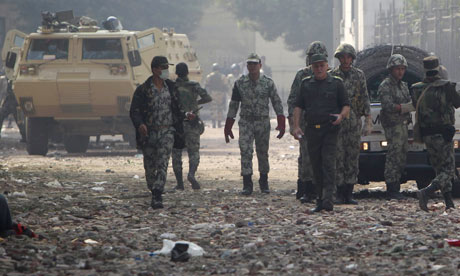Here's a summary of events today.
• Yemeni President Ali Abdullah Saleh has signed a Gulf Arab proposal to transfer power. The deal means Saleh retains the honorary title of President while his deputy, Abd al-Rabb Mansour al-Hadi, forms and presides over a government of national unity until early presidential elections in February.
• President Barack Obama said the move brings the Yemeni people "a significant step closer to realizing their aspirations for a new beginning in Yemen". The GCC deal was backed by the US and its Gulf allies. There have been concerns a security collapse in Yemen would allow al-Qaida to get a firmer foothold.
• Thousands of protesters have again gathered in and around Tahrir Square, where clashs continue with police. Security forces continued to fire teargas and rubber bullets into crowds. Earlier AP reported that most of the clashes have centered today on the Interior Ministry near the square.
• A doctor working in Cairo's Tahrir Square has reportedly died from teargas used against demonstrators. Al-Masry Al-Youm newspaper, quoting eyewitnesses, said police "shot teargas directly at the field hospital on Mohamed Mahmoud Street, causing the doctor, Rania Fouad, to faint and enter a coma".
• Several political parties are reportedly discussing the possibility of calling for next week's elections to be postponed due to the violence. Ahram Online said they were keen for voters in Cairo and Alexandria- and other protest hotspots- to not go to the polls until next year. The Muslim Brotherhood is opposed to such a move, insisting the first round of the parliamentary elections must go ahead.
Thanks for reading.
The US and its powerful Gulf allies pressed for the GCC deal that former Yemeni president Saleh signed today, concerned that a security collapse in the impoverished Arab nation was allowing an active al-Qaida franchise to gain a firmer foothold, according to AP.
Saleh is the fourth Arab leader toppled in the wave of Arab Spring uprisings this year, after longtime dictators fell in Tunisia, Egypt and Libya. The deal gives Saleh immunity from prosecution contradicting a key demand of Yemen's opposition protesters.
Seated beside Saudi King Abdullah in the Saudi capital Riyadh, Saleh signed the US-backed deal hammered out by his country's powerful Gulf Arab neighbors to transfer power within 30 days to his vice president, Abed Rabbo Mansour Hadi. That will be followed by early presidential elections within 90 days.
"This disagreement for the last 10 months has had a big impact on Yemen in the realms of culture, development, politics, which led to a threat to national unity and destroyed what has been built in past years," he said.
President Barack Obama welcomed Saleh's decision, saying it is an important step forward for the Yemeni people. He urged all involved to move immediately to implement the agreement. Obama said the U.S. would stand by the Yemeni people "as they embark on this historic transition" to realize their aspirations for a new beginning, and he acknowledged "important work" done by Gulf allies.
[...] Shortly before Saleh inked the agreement, UN Secretary-General Ban Ki-moon said the president told him he will travel to New York for medical treatment after signing it. He didn't say when Saleh planned to arrive in New York, nor what treatment he would be seeking.
[...] For months, the US and other world powers pressured Saleh to agree to the power transfer proposal by the Gulf Cooperation Council, and he agreed then backed down several times before. All the while, the uprising raged, security and the economy deteriorated. Al-Qaida in the Arabian Peninsula grew more bold, even seizing some territory.
Even before the uprising began, Yemen was the poorest country in the Middle East, fractured and unstable with a government that had weak authority at best outside the capital Sana'a.
Security is particularly bad in southern Yemen, where al-Qaida militants from one of the world's most active branches of the terror network have taken control of entire towns, using the turmoil to strengthen their position.
The nation of some 25 million people is of strategic value to the United States and its Gulf Arab allies, particularly Saudi Arabia. It sits close to the major Gulf oil fields and overlooks key shipping lanes in the Red and Arabian seas.
Over at Magnum photos Moises Saman has posted a gallery of images from Tahrir Square over the past few days.
"On Friday, November 18th, activists took to Cairo's Tahrir Square, demonstrating against the military rule and hoping to educate civilians about the voting process," the gallery caption reads.
"When police cleared the area of demonstrators the next day, the clashes escalated, leading to over a thousand non-fatal and dozens of fatal casualties. Moises Saman has been documenting events in and around Cairo."
Egypt's Muslim brotherhood may have been severely damaged by their decision to stay on the sidelines of this week's protests demanding the military council step down, AP writes.
By staying out of the protests, "the Brotherhood has made it clear that they want elections because they want the seat of power, no matter what that seat looks like," said Abdel-Jalil el-Sharnoubi, who once headed the Brotherhood's website until he quit the group earlier this year in frustration with its leadership.
Ever since the Feb. 11 fall of autocratic leader Hosni Mubarak, fears have been growing among some Egyptians that the country would take a strong turn toward Islamic fundamentalism.
The Brotherhood was long repressed under Mubarak but it built up Egypt's largest and most disciplined political organization, with tens of thousands of members around the country, as well as a network of charities providing food, money and medical care to the poor. They have been campaigning furiously for months, while liberal, leftist and secular parties that arose since Mubarak's fall have been disorganized and divided, struggling to build up their national presence.
But the group's popularity has limits. Particularly, even many Egyptians who have no problem with greater religious conservatism in public life are suspicious that the Brotherhood is too authoritarian in its ways and too eager to rule. For that reason, the blow to the Brotherhood reputation stings, undermining the image it has pushed hard in its election campaign that it is a trustworthy, pious group that as their slogan declares "brings good for Egypt."
The explosion of protests against the military, which stepped in to rule when Mubarak fell, pushed the Brotherhood into a corner. Activists accuse the generals of acting as much the dictators as Mubarak and seeking to retain power. The protests, which began Saturday, have only grown as security forces try to suppress them, killing nearly 40 people even as the crowds have swollen to tens of thousands.
The Brotherhood refused to join the rally out of fear they would swell out of control and delay the elections. On Tuesday, the Brotherhood and several smaller parties met with the generals of the Supreme Council of the Armed Forces and agreed to a compromise.
Under the deal, the military would form a new interim civilian government, parliamentary elections would go ahead on schedule, but presidential elections would be moved up to the end of June, after which the military would step aside.
Protesters rejected the deal, demanding the generals surrender power immediately.
The damage from staying out of Tahrir may not be heavy enough to set back the Brotherhood's election showing, given its powerful campaign machine. In one possible scenario, the violence in Cairo's Tahrir Square and in cities around the country could even benefit it. If turmoil reduces turnout at the polls, the Brotherhood's results could be inflated because its supporters are the most organized and will cast ballots in large numbers no matter what.
But the chaos will undermine the legitimacy of the vote, and the parliament that emerges will have a deeply damaged mandate. Many liberals already say the parliament won't be truly representative. Even if the Brotherhood and other Islamic parties gain the largest bloc or majority, they will have a difficult time pushing through any agenda at a time when divisions among all Egypt's factions have been enflamed by the past week's violence.
Jack Shenker is in Tahrir Square in Cairo, and reports "a mixture of the festive and the fearful". There are large numbers in the square, Jack says, but people have divided into huge lines to allow ambulances in and out of Tahrir, carrying away the wounded from "the front line" down Mohamed Mahmoud Street.
"Tantawi's speech last night hasn't persuaded anyone here to get moving yet," Jack says. He says there is tear gas in the air, but "it's nothing compared to what we've seen over the last two days".
About a hundred metres down it would be far far stronger, because on the front line tear gas is still being fired, shots are still ringing out. As its always been for the past four days there's slightly surreal gaps, where down Mohamed Mahmoud there's this incredibly intense gorrilla warfare going on, and just round the corner in Tahrir Square there's this rather more carnival-esque atmosphere going on.
President Barack Obama has issued a statement welcoming the agreement signed by Saleh to hand over power.
Obama said the move brings the Yemeni people "a significant step closer to realizing their aspirations for a new beginning in Yemen".
I welcome today's action by the Yemeni government and the opposition to sign a political agreement brokered by the Gulf Cooperation Council to form a government of national unity within 14 days and hold early presidential elections within 90 days. In particular, the United States welcomes President Ali Abdullah Saleh's decision to transfer executive powers immediately to the Vice President in accordance with the agreement. This represents an important step forward for the Yemeni people, who deserve the opportunity to determine their own future.
For ten months, the Yemeni people have courageously and steadfastly voiced their demands for change in cities across Yemen in the face of violence and extreme hardship. Today's agreement brings them a significant step closer to realizing their aspirations for a new beginning in Yemen. The United States urges all parties to move immediately to implement the terms of the agreement, which will allow Yemen to begin addressing an array of formidable challenges and chart a more secure and prosperous path for the future. The United States will continue to stand by the Yemeni people as they embark on this historic transition. We also acknowledge the important work done by our GCC partners in supporting this step forward.
Tom Finn in Yemen has just been on the line from Change Square in Sana'a, with more reaction to Saleh signing the deal to step aside and transfer power to his deputy.
Saleh's signing of the deal "offers up a window of opportunity for politics to move forward," Tom says.
We've been stuck in the same situation in Yemen for months. Now the deputy has the power to form a national government and prepare for these elections.
The fact they're saying elections are going to take place in three months in Yemen is a bit of a joke to be honest, it's very unlikely to happen. But at least it moves things forward to a new chapter.
Tom says Saleh's deputy, Abd al-Rabb Mansour al-Hadi, who will form and preside over a government under the deal, has been a "politicall crippled figure for the last 20 years, mainly because the power in Yemen has been so concentrated on Saleh and his family".
However al-Hadi is viewed "quite favourably" by both sides. There is speculation that al-Hadi will win the next general election, Tom says, and "both parties will be trying to get him as their candidate. At the moment there's no real contester to him."
Some of the tear gas being used in Tahrir Square could have been manufactured as long ago as 1985, according to photos taken by Emad El-Din Shahin, a professor at the University of Notre Dame, Indiana.
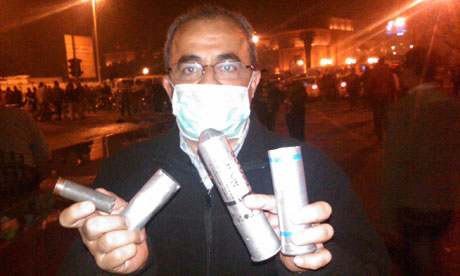 Photograph: Emad El-Din Shahin
Photograph: Emad El-Din Shahin
The picture above shows Shahin holding several projectiles. In an email which was shared with the Guardian's Jack Shenker, Shahin writes:
"As you will see from the canister I am holding, this gas bomb was manufactured in Feb. 1985!"
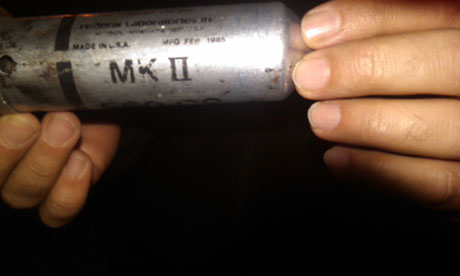 Photograph: Emad El-Din Shahin
Photograph: Emad El-Din Shahin
The image above shows the canister more clearly.
The reaction in Sana'a to Saleh's signing of a deal to transfer power is "confused and chaotic", my colleague Tom Finn writes.
There are mobs of pro-government supporters cruising the streets with batons and posters of Saleh, some firing machine-guns in the air in anger.
Just a few miles away people are celebrating in Change Square, letting off fireworks, waving tribal daggers and dancing in circles. The sound of fireworks in Change Square is still deafening, but there also lots of bystanders watching the celebrations saying they're not celebrating and that they do not see Saleh's signing as a victory.
A young man named Nazir just came up to me and said in perfect English: "We don't trust Saleh to honour the deal, this deal is not for us it's for the political parties, tomorrow we will burn our election cards and march in support of the Egytian youth."
Others are saying that they won't leave Change Square until the rest of Saleh's family (most notably his son Ahmed, who still heads the republican guard) has left power.
I've just been speaking to Rasha Shaaban, who lives in Alexandria, Egypt, but was driven out of her apartment in Smouha yesterday by an intense cloud of tear gas which drifted into the building.
Shaaban says she believes the people causing the violence in Alexandria are supporters of ex-president Hosni Mubarak who are attempting to sabotage the protest. "They are not the youth of the revolution," she says. Shaaban says most protesters keep calling for demonstrations to be "peaceful", but the violence is caused by "criminals".
She was critical of the amount of tear gas used by riot police. It is being used "constantly, every second" she said.
"It has become unacceptable. For four consecutive nights we have had street fights ongoing. Last night [there were] almost 12 hours of street fights and clashes. It was so traumatic that I was driven out of my place."
Police in Cairo have been accused of using a stronger form of tear gas to quell protests. Shaaban said she believes the gas being used in Alexandria is also a more potent form than has been deployed before.
"I was there on the 28 January when the main clashes took place in Alexandria," she said. "... the tear gas at that time, it was too strong, but actually now, it's far worse."
Egypt's minister of health has denied nerve gas has been used in and around Tahrir Square, according to Daily News Egypt.
Amr Helmy confirmed live ammunition is being used, but said the police were not to blame. The health minister urged protesters to leave Tahrir Square, but was "kicked out" himself, according to Daily News.
Minister Amr Helmy confirmed that live ammunition was used, causing several deaths. However, he added, police is not to blame for that and it is up to the prosecutor to determine the culprit.
"Yesterday they found three Americans instigating people against police forces. You can never know if live ammunition was local or international, used by the police or other external forces; we have to wait for the investigations," he said.
Thirty-five were killed in clashes with security forces in protests around the country, the ministry said. The number is contested by rights groups that say it's 38.
[...] Helmy denied reports that nerve gas was used. Police has been using firing teargas canisters intensively at protesters in Mohamed Mahmoud Street. Many said the symptoms were much worse than those caused by tear gas used in January, at the start of an uprising that ousted Hosni Mubarak.
The US Embassy in Damascus has repeated a message urging American citizens in Syria to leave immediately.
The embassy says the "number of airlines serving Syria has decreased significantly since the summer, while many of those airlines remaining have reduced their number of flights".
The state department has been urging people to leave the country for some months.
Here's a summary of developments in the Middle East today.
• Yemeni President Ali Abdullah Saleh has signed a Gulf Arab proposal to transfer power. The deal means Saleh retain the honorary title of President while his deputy, Abd al-Rabb Mansour al-Hadi, forms and presides over a government of national unity until early presidential elections in February.
• A doctor working in Cairo's Tahrir Square has reportedly died from teargas used against demonstrators. Al-Masry Al-Youm newspaper, quoting eyewitnesses, said police "shot teargas directly at the field hospital on Mohamed Mahmoud Street, causing the doctor, Rania Fouad, to faint and enter a coma".
• Thousands of protesters have again gathered in and around Tahrir Square, with some clashes with police. Security forces continued to fire teargas and rubber bullets into crowds. Earlier AP reported that most of the clashes have centered today on the Interior Ministry near the square.
• Several political parties are reportedly discussing the possibility of calling for next week's elections to be postponed due to the violence. Ahram Online said they were keen for voters in Cairo and Alexandria- and other protest hotspots- to not go to the polls until next year. The Muslim Brotherhood is opposed to such a move, insisting the first round of the parliamentary elections must go ahead.
A doctor working in Tahrir Square is reported to have died from teargas used against demonstrators, reports Al-Masry Al-Youm newspaper.
Eyewitnesses say the police shot teargas directly at the field hospital on Mohamed Mahmoud Street, causing the doctor, Rania Fouad, to faint and enter a coma. They also say the police forbade her colleagues from moving her away from the scene.
This report could not be independently confirmed. But if true, it certainly adds to the speculation surrounding the teargas being fired at the protesters.
I'm handing over the blog to my colleague Adam Gabbatt now.
The long-awaited report into the events of Bahrain's Pearl Revolution is no whitewash, as elements of the country's opposition warned in advance it would be, writes the Guardian's Middle East editor, Ian Black.
However action on key issues remains the preserve of the government and- strikingly- the report does not call for the release of any prisoners despite documenting the use of forced confessions.
The Bassiouni commission did find "systemic use" of "physical and psychological mistreatment, which in many cases amounted to torture, with respect to a large number of detainees" in the custody of the Ministry of Interior and National Security Agency. Allegations of torture, it recommended, should be investigated by an independent and impartial body.
The Manama goverment worked hard to "spin" that central finding, using a distinction that might not bear too close scrutiny: "Regrettably the report confirms that there have been instances of excessive force and mistreatment of detainees, as well as five deaths as a result of torture," it said, adding: "The report does not confirm that there was a government policy of torture, mistreatment or using excessive force."
But the BICI does demolish a key government claim, stating baldly that it found no "discernible link" between specific incidents in Bahrain and Iran — only to be contradicted by King Hamad.
Bassiouni's team noted official claims that 30 of of 53 religious structures that were destroyed had been used for attacks against police and to manufacture and store weapons. Some mosques and prayer houses lacked building permits, but, the report says, "the government should have realised that....the timing (and) the manner in which demolitions were conducted and the fact that these were primarily Shia ...would be perceived as a collective punishment and..inflame the tension between the government and the Shia population."
Hundreds of students were dismissed from university after being photographed demonstrating; 1624 people alleged that they had been dismissed or suspended from work. Shia employees were often treated differently from non-Shia, "creating a reasonable presumption that many were subjected to discrimination."
The report gives a flavour of the sharp polarisation in Bahraini life. Sunnis claimed that Shia journalists tended to exaggerate the harm suffered by Shia while downplaying or neglecting harm to Sunnis and "considered this to be an example of discrimination." International media "portrayed the Shia community as victimised which was inaccurate...and gave rise to bias against Sunnis and gave Shia a justification to commit violence against Sunnis."
Bassiouni said that 35 people were killed, including five security personnel. On Tuesday, however, a coalition of Bahraini human rights groups claimed that 45 people died.
Contrary to what the military authorities had hoped, the clashes in Cairo show no sign of dying down.
The Guardian's Martin Chulov (@martinchulov) reports:
More injured in #Tahrir now than at any other time today. Tear gas hanging like heavy mist. Triage centres over-run #Egypt
Saw 2 girls violently convulsing for 20 min after gassed near #Tahrir. Drs said reaction psychic. Looked much more than that #Egypt
Thousands of people, including women and children, are being illegally detained by rebel militias in Libya, according to a report by the Secretary-General of the United Nations and obtained by the Independent.
Many of the prisoners are suffering torture and systematic mistreatment while being held in private jails outside the control of the country's new government.The document states that, while political prisoners being held by the Gaddafi regime have been released, their places have been taken by up to 7,000 new "enemies of the state", "disappeared" in a dysfunctional system, with no recourse to the law.
The report will come as uncomfortable reading for the Western governments, including Britain, which backed the campaign to oust Gaddafi. A UN resolution was secured in March in order to protect civilians from abuses by the regime, which was at the time mercilessly suppressing the uprising against the Gaddafi regime.
There was evidence, says the report by Ban Ki-moon, due to be presented to the Security Council, that both sides committed acts amounting war crimes in the bitter battle for Colonel Gaddafi's hometown, Sirte.
Egyptian troops have moved into the streets around the Interior Ministry in Cairo, replacing the loathed riot police, Reuters reports.
As Jack Shenker predicted earlier, the move appears to have been made in an attempt to quell tensions. Reuters writes:
The removal of the widely hated police seemed to be part of efforts to calm violence that has killed more than 30 people and wounded 2,000 in Cairo and elsewhere in six days of protests targeting the ruling military council, not the army itself.
However tensions have certainly not been quelled. The truce in Mohamed Mahmoud street appears to have given way to fresh clashes. AP reports:
The truce was soon breached when police fired a barrage of tear gas and rubber bullets and the protesters responded with rocks. It was not clear who resumed the fighting.
Metres away, in Tahrir Square itself, thousands of people converged as night fell, Reuters said.
Vendors were selling everything from snacks to face masks for protection against wafting tear gas.
Fatihia Abdul Ezz, a 60-year-old woman, said she had come to the square for the first time after seeing images of violence. "They (the army rulers) were with Mubarak from the start," she said. "I came when I saw our sons being killed."
Protesters unfurled a huge sign denouncing army commander Field Marshal Mohamed Hussein Tantawi, Enan and the council that has run Egypt since Mubarak's overthrow.
"Down, down with military rule. We the people are the red line. The people want to bring down the field marshal, Sami Enan and the military council," it read.
The EU and the US should halt all arms sales to Bahrain until it can prove that human rights violations have ended, said Maryam al-Khawaja head of foreign relations at the Bahrain Centre for Human Rights.
Speaking in response to the publication of the report by the Bahrain Independent Commission of Inquiry into human rights abuses during the crackdown, al-Khawaja conceded the report was not a white wash.
There were some good recommendations made but the question is whether the government is going to follow up on it.
In a Skype interview, al-Khawaja, whose father was one those given a life sentence for taking part in the protests, criticised King Hamad's response to the report.
[Cherif] Bassiouni [chairman of the commission] was talking about how there were severe violations of human rights, and then the King comes out and thanks the police and the security forces. Bassiouni talks about how there was absolutely no evidence of Iran being involved [in the uprising] and the King comes out and says it was all Iran's fault - they were instigating violence.The King made promises in 2001-2002. He said there would be a constitutional monarchy and instead 10 years later the people of Bahrain are dealing with an authoritarian regime.
Recently the King has promised no more military trials [and] no more sackings [of those who took part in protests] and that has yet to happen. So if they can't even follow up on these promises, how can we think that they will make huge reforms steps. I hope they do take those steps, but do I actually think they will? I really doubt it.
As long as these human rights violations are ongoing, even if the government is promising things, there needs to be a completely cease to the sale of arms to the Bahraini government. Just this morning there was another killing.
Al-Khawaja was troubled by a reference in the report to killing of an unarmed civilians as falling within the law when there was video evidence suggesting the man was shot with no warning.
"That for me was a very clear signal that there is something missing," al-Khawaga said.
She pointed out that youth activist had already called for a mass protest in response to the report.
The deal that Ali Abdullah Saleh has signed means he will immediately transfer his powers to the vice president and that he will be given immunity from prosecution, writes Tom Finn in Sana'a.
With the economy on the verge of collapse and bloody clashes breaking out between armed factions of the military, Yemenis are hoping the agreement will offer a way out of the ten-month long turmoil that has left hundreds dead and the country teetering on the brink of civil war.The deal, first drawn up by the gulf monarchies back in April, sees Saleh retain the honorary title of President while his deputy, Abd al-Rabb Mansour al-Hadi, forms and presides over a government of national unity until early presidential elections in February. In return for signing, Saleh and his family are guaranteed immunity from prosecution.
Saleh had clung to power despite months' of street protests, defections by top generals, ambassadors and senior members of his government and a June bomb attack on his palace that left him bed-ridden for three months in a Saudi Arabian hospital.
But the deal, which will see many of Saleh's relatives retaining government and military positions, is unlikely to appease the thousands of youthful protesters who remain camped out in city squares across the country demanding Saleh's prosecution.
As news of Saleh's departure for Riyadh spread, a spontaneous march broke out in Sana'a. Thousands of young men surged out of their tented encampment, dubbed Change Square, kicking up dust with their feet, banging car bonnets with their fists shouting, "No to immunity, no to Saudi, no to Ahmed Ali."
"If Saleh comes back we'll put him in the court," said Mohammed Abdullah al ghafari, 24, medical student, holding up a poster of Saleh and Saudi Arabia's King Abdullah engulfed in flames. "How can we accept immunity when the blood of our Martyrs still stains the ground?"
The youth activists claim the agreement is a deal between political elites, and does not address their more fundamental demands. A growing rift has emerged between the political opposition, headed by the Islamist Islah party, and the self-named "independent youth" who first took to the streets back in February.
Others are fearful that Saleh's sudden departure will re-ignite hostilities between his supporters and his opponents. Two of Saleh's key rivals, the renegade general Ali Mohsen al-Ahmar, and the tribal leader Hamid al-Ahmar, were not party to the accord.
With King Abdullah of Saudi Arabia sitting alongside him, Ali Abdullah Saleh has signed on the dotted line of the GCC-backed deal to usher him from office.
The president is currently speaking, blaming 'Zionists' for some of the violence that has beset the country in recent months and saying it will take years for Yemen to recover from the crisis. He is acknowledging the lives lost during the uprising.
Speaking earlier, the UN special envoy Jamal bin Omar who has been struggling for months to get the deal signed, said he hoped the deal would lead to "security and stability in Yemen".
I'm very glad to reach this day. It's an historic day.
Yemeni President Ali Abdullah Saleh has signed a Gulf Arab proposal to transfer power, AP reports.
Yemen's president Ali Abdullah Saleh has told the U.N. secretary-general that he will sign a deal that would ease him from power and head to the United States for medical treatment, Reuters reports.
Ban Ki-Moon is quoted as saying:
He told me that he will come to New York to take medical treatment immediately after signing this agreement.
Ban told reporters he had spoken to Saleh yesterday. The Yemeni leader, who has repeatedly backed out of signing a Gulf-backed deal for him to leave office, arrived in Saudi Arabia today to finally put pen to paper.
He provided no information about when Saleh planned to arrive in New York, nor what treatment he would be seeking.
Saleh was previously forced to seek treatment in Saudi Arabia for injuries suffered in an apparent assassination attempt in June after the last time he ducked out of the deal, which ushered in street battles that devastated parts of the Yemeni capital Sanaa.
It does seem that the brief lull in fighting on Mohammed Mahmoud in Cairo is well and truly over, according to the tweets of journalists on the ground.
Here is a selection of their posts from the last half hour.

Beltrew Bel Trew
Crowds running down mohamed mahmoud street. #tahrirsharifkouddous Sharif Kouddous
Huge volleys of tear gas. Chaos again.Beltrew Bel Trew
Mohamed mahmoud is a two way traffic of ambulances #tahririaninegypt Ian Lee
Heavy amount of weapon fire on Mohamed Mahmoud street. Tear gas and rubber bullets. #egypt #tahrirIan Lee
ianinegypt Ian Lee
Mohamed Mahmoud street is one again a battlefield. #egypt #tahririaninegypt Ian Lee
Around 10 ambulances are making their way down Mohamed Mahmoud street. #egypt #tahrirBeltrew Bel Trew
Mohamed mahmoud is a two way traffic of ambulances #tahrirSharif Kouddous
sharifkouddous Sharif Kouddous
Fighting has resumed. Tear gas is back. People being carried passed out
The full 489 page report into alleged human rights abuses by the Bahrain Independent Commission of Inquiry is available here in a pdf.
Some of the many recommendations include:
• commuting the death sentences given to those by the military courts in the wake of the unrest
• requiring the attorney general to investigate claims of torture and use independent forensic experts to do so
• make all convictions by military court subject to review by civil courts
• allow all those arrested access to lawyers and communications with their families
• award compensation to victims of the crackdown
• reinstate any employees sacked for taking part in the protests
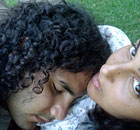 Alaa Abd El Fattah with his wife Manal. Photograph: Nasser Nasser/AP
Alaa Abd El Fattah with his wife Manal. Photograph: Nasser Nasser/AP
It looks like Thursday could be a big day for Alaa Abd El-Fatah, the detained Egyptian blogger, Ahram Online reports.
After last night's announcement by the Scaf authorities that an inquiry into last month's Maspero clashes will be transfered to general prosecutors- rather than military ones- hope is growing that Abd El-Fatah could be released, AO says.
Abd El-Fatah, who has been accused of inciting violence during the 9 October Maspero clashes, will accordingly be referred to Egypt's general prosecution, along with other civilian defendants in the case. There is some speculation that Abd El-Fatah could be released as soon as Thursday.
Thursday also happens to be the due date for Abd El-Fatah's wife, Manal Hassan, adds AO. The blogger's mother, political activist and academic Laila Soueif, went on hunger strike over a fortnight ago to call for her son's release.
The move to hand over the inquiry into the Maspero killings- in which 27 people, mostly Christians, died in a protest- was one of the Scaf's concessions offered last night. The authorities have also ordered the release of 312 protesters detained over the past days.
There are unconfirmed reports that whatever truce there was on Mohamed Mahmoud street is now over.
Al Jazeera English (@AJELive) tweeted four minutes ago:
AJE online producer Asad Hashim says police have just ended the cease fire near the Interior Ministry w/ tear gas barrage #Tahrir #Egypt
Journalist Bel Trew (@Beltrew) posted:
It's started again on mohamed mahmoud #tahrir
And @ianinegypt, video reporter Ian Lee, said:
Tear gas fired again. Crowd disperses. Rocks are flying. #egypt #tahrir
Earlier this afternoon, Ahram Online reported that Scaf is denying any use of teargas by its security forces.
Egypt's ruling military council denies "rumours of army forces using tear-gas cannisters against protesters," in communiqué no.83 issued on the SCAF's official Facebook page.
The communiqué stated that army forces have not fired tear-gas at protesters "in Cairo or Alexandria or anywhere else [in Egypt]."
Five Egyptian and Arab human rights organisations have united to say they will identify and prosecute officials involved in the violent crackdown of protesters.
In a press release, the Egyptian Initiative for Personal Rights, Hisham Mubarak Law Centre, Cairo Institute for Human Rights Studies, El-Nadim Centre for the Rehabilitation of Victims of Violence, and the Arabic Network for Human Rights Information said the attacks constituted criminal offences.
[The organisations] pledged to continue to identify the civilian and military officials involved in killing demonstrators, bursting their eyes and breaking their bones and skulls. These crimes have been extensively documented by these organizations and by the media over the past few days.
The list of officials the organisations plan on prosecuting includes
General Hasan al-Ruwaini, commander of the central command and considered the third most powerful figure in Scaf, and General Hamdy Badeen, head of the military police.
Issandr El Amrani of the Arabist blog said the move marked "a major taboo being broken".

An uneasy ceasefire appears to be holding on Mohamed Mahmoud street, the site of the main fighting just off Tahrir Square, reports the Guardian's Jack Shenker.
Within the past hour a group of sheikhs from Al-Azhar [university] seemingly formed a protective shield between the protesters and armed police, and then approached the security forces to negotiate a truce. How durable it will be remains to be seen, but we have heard news that the army is reportedly planning to withdraw the riot police from this area and replace them with soldiers in a bid to quell tensions.
Jack said he had been speaking with a senior western diplomat who had some interesting insights into the international reaction to Tantawi's speech last night.
He says his view, which is broadly shared by others, is that Scaf's concessions are a 'fudge', "another half-step too late, which has really been the hallmark of this so-called Scaf-sponsored 'transition'."
He added: "People have long said that in January and Fenruary the Mubarak regime was scalped rather than beheaded; now they're saying it wasn't even a scalping, but more a light haircut. The idea of a 'nation salvation government' sounds good, but if that government remains essentially an implementing body for Scaf, which continues to rule by decree, then fundamentally nothing will have changed."
The diplomat also speculated that the number of those killed in these clashes could be much higher than the official death toll, something many doctors have also hinted at, said Jack.
The live address of Bahrain's King Hamad came before the full details of commission's report were published.
But details are emerging about what it contains. AP has this:
The head of a special commission that investigated Bahrain's unrest says authorities used torture and excessive force against detainees arrested in crackdowns on the largest Arab Spring uprising in the Gulf.
The comments by Mahmoud Cherif Bassiouni are the first details from a highly anticipated report being released Wednesday on the harsh measures used against Shia-led demonstrators seeking greater rights from Bahrain's Sunni monarchy.
Bassiouni's summary suggests the report will be highly critical of officials in the strategic kingdom, which is the home to the US Navy's 5th Fleet.
The investigation, authorized by Bahrain's rulers, was based on more than 5,000 interviews.
Reuters adds:
Bahrain's security forces used excessive force to suppress protests earlier this year, an inquiry commission said on Wednesday, and urged a review of sentences handed down by authorities against those it held responsible for the turmoil.The panel, led by Egyptian-American international law expert Cherif Bassiouni, was formed and funded by Bahrain's government five months ago to investigate any crimes committed during the worst unrest seen in the island kingdom since sectarian-tinged political violence shook Bahrain in the mid-1990s.
Confessions were extracted under duress and detainees were tortured, Bassiouni said in a speech delivered at the palace of Bahrain's King Hamad, adding that while 35 were killed, including five security personnel.
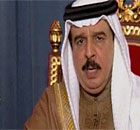
Bahrain's King Hamad bin Isa Al Khalifa said today report into human rights abuses at the start of an anti-government uprising, would be a "catalyst for change".
In a live TV address he pledged that civilians would no longer be tried in military courts. He said he was dismayed by reports of the mistreatment of prisoners in the report.
He said the report would need time to digest and promised to set up a working group on dealing with its recommendations.
"Your report provides a historical oportunity to deal with matters that are urgent," he said. He promised to replace officials responsible for the abuse and to "heal fractures in our society".
The King said the today's report "turned a new page in history".
But in a defiant note he pointed out the European countries are also accused of human rights abuses. He also called for the creation of an Arab court of human rights.
King Hamad praised the security forces and public for overcoming "sectarian violence".
Time for a summary of the latest developments.
Egypt
• Protesters have gathered in and around Tahrir Square for a fifth day, clashing with riot police as they demand the end of military rule. As a human rights group raised the death toll from the latest violence to 38, security forces continued to fire teargas and rubber bullets into crowds. AP reported that most of the clashes have centered today on the Interior Ministry nearby Tahrir.
• Rather than being placated by Scaf's offer of concessions, the protesters have returned to Tahrir today with "renewed momentum", said the Guardian's Martin Chulov. He said the chief demand of the crowd was now the formation of a 'national salvation' government to replace Scaf and oversee the country until elections. (See 11.31pm.)
• Several political parties are reportedly discussing the possibility of calling for next week's elections to be postponed due to the violence. Ahram Online said they were keen for voters in Cairo and Alexandria- and other protest hotspots- to not go to the polls until next year. The Muslim Brotherhood is opposed to such a move, insisting the first round of the parliamentary elections must go ahead.
• The UN High Commissioner for Human Rights has called for an independent inquiry into the killing of protesters in Tahrir Square, urging the security forces to end their "clearly excessive use of force". Navi Pillay castigated the "apparent improper use of tear gas, rubber bullets and live ammunition." Medical staff said many casualties had bullet wounds, but that such wounds could also be caused by rubber bullets at short range. The military continues to deny it has used live ammunition on the crowds. (See 11.25am.)
• The teargas being used on the protesters continues to cause alarm. A video has emerged of a victim apparently experiencing muscle spasms. The Guardian and Observer's Peter Beaumont tweeted: "I've been tear gassed more than a few times in my life but I've never seen CS cause seizures before." (See 11.40am.)
• William Hague has criticised the reported use of "dangerous forms of gas" and live ammunition in his latest statement on Egypt. Expressing his deep concern at the "unacceptable violence and loss of life", the foreign secretary called on the authorities to stop their crackdown- but did not call on them to step down immediately, saying only that a "clear, rapid timetable for transition to civilian rule" was needed. (See 11.52am.)
Bahrain
• Police used teargas and sound bombs to break up protests ahead of the publication of a report into alleged human rights abuses during the crackdown at the start of the kingdom's pro-democracy uprising in February and March. Protests began in A'Ali, 30km south of the capital, after reports that the police killed a driver by running him off the road, al-Jazeera reported.
• The report is expected to criticize the government after it admitted using excessive force. But campaigners claim it is PR exercise aimed at securing a $53m US arms deal that Washington has made contingent on the outcome of the report.
Yemen
• President Ali Abdullah Saleh has travelled to Saudi Arabia to sign a Gulf-brokered deal to transfer power in return for immunity from prosecution. Under the deal, agreed by opposition politicians but not key militia leaders, Saleh will hand power to his deputy and elections will be held within 90 days.
• News of the deal sparked demonstrations in the capital Sana'a by anti-goverment protests. They were angry at the immunity clause in the deal and the lack of genuine reform, according to our correspondent Tom Finn.
Syria
• Turkey continues to lead diplomatic pressure against the Assad regime in the wake of vote by the UN human rights committee to condemn Syria's crackdown. President Abdullah Gul said the Syrian government had reached a point of no return. China said the UN vote was "unhelpful".
• Activists claim nine people, including a child, have been killed by the security forces on Wednesday. It follows the deaths of 33 people on Tuesday. (See 12.47pm.)
Activists claim nine people, including a child, have been killed by the security forces in Syria. The Local Co-ordination Committee of Syria claimed three of the deaths occurred in Hama.
Meanwhile, the Free Syrian Army has claimed responsibility for the killing of eight members of the security forces and issued another video showing around a dozen new recruits.
Syrian blogger Maysaloon is concerned about the increasingly violent nature of the uprising.
I still think this Free Syrian Army business is a recipe for trouble. Many Syrians might disagree with me, and I'm certainly not in a position to tell anybody what to do, but it is important to approach this phase with caution. The prospect of a civil war is, at this stage, very real and has the potential to plunge the country into a dark place from which it might not emerge in our lifetimes...
On the diplomatic front Turkey continues to wage a war of words with Syria. Yesterday prime minister Recep Tayyip Erdogan urged Assad to stand down or face the same fate as Muammar Gaddafi. Today President Abdullah Gul said the Assad regime had reached a "point of no return."
Speaking at a conference in London, Gul said:
We exerted enormous efforts in public and behind closed doors in order to convince the Syrian leadership to lead the democratic transition. Despite all this the Baath regime continues to use oppression and violence on its own people. Violence breeds violence. Now, unfortunately, Syria has come to a point of no return.
The reports of clashes from Tahrir continue. This morning unconfirmed Tweets indicated that a girl was shot in the face by the security forces.

@khalidabdalla A girl just got shot in the face in mohamed mahmoud. #tahrir@sallyzohney Military Police is shooting LIVE bullets on protesters in Mohamed Mahmoud, a girl is hit in the face #tahrir
@beltrew A girl just got shot in the face. Scenes very violent in #tahrir this morning
@Occupy_Tahrir: A girl just got shot in the face at Mohammed Mahmoud St. her face is covered in blood, we can't tell how bad the wound is. #Tahrir #SCAF
As AP report this morning, there is confusion over the origin of many of these kinds of wounds. Shady el-Nagar, a doctor in one of Tahrir's field hospitals, is quoted as saying that three bodies had arrived in the facility on Wednesday, all three with bullet wounds.
We don't know if these were caused by live ammunition or pellets because pellets can be deadly when fired from a short distance.
Several Egyptian political parties are considering calling for the upcoming elections to be delayed for a fortnight, Ahram Online reports.
According to the sources, such a proposal would imply putting off the first stage of the elections, in which polling was due to be held in 9 governorates, including Cairo and Alexandria, where Egypt's re-launched revolution is at its most powerful.
According to the time-table set by the ruling Supreme Council of Armed Forces (Scaf), elections were to be held in three stages, each involving polling in 9 of the country's 27 governorates. The first stage is due to begin on November 28th.
The proposed two-week postponement would see the governates due to vote in stage two brought forward to stage one, and would mean that the hotbeds of unrest would not vote until well into next year, the paper wrote.

William Hague has criticised the reported use of "dangerous forms of gas" and live ammunition in his latest statement on Egypt.
Expressing his deep concern at the "unacceptable violence and loss of life", the foreign secretary called on the authorities to stop their crackdown- but did not call on them to step down immediately, saying only that a "clear, rapid timetable for transition to civlian rule" was needed.
I call on the Egyptian authorities to respect the right of peaceful protest and immediately to cease the use of violence against protestors, including live fire and the use of gas. All those who are responsible for such disproportionate violence against peaceful protesters must be held to account.I also call for the release of all those detained for peacefully expressing their views and urge the authorities to make good on their promises to end to military trials for civilians.
I recognise the commitments made by Field Marshal Tantawi yesterday evening. We and many other countries have consistently called for a clear, rapid timetable for transition to civilian-led democratic rule in Egypt.
For such a transition to succeed, it is critical that parliamentary elections are transparent, fair and credible, and held in a secure atmosphere which allows Egyptians to express their political will freely. The UK remains committed to supporting the transition to democracy in Egypt in any way we can.
There has been a lot of speculation over the kind of teargas being hurled at protesters by the security forces during the latest clashes.
Many demonstrators have reported that its effects are particularly nasty, although experts told the Guardian earlier in the week that the gas was likely to be standard CS gas, its impact exacerbated by physical exertion.
Issandr El Amrani, who writes the Arabist blog, said last night there was "mounting indication" that the gas being used by the security forces might be "CR gas as opposed to normal tear gas which is CS gas."
A lecturer in neurology at Ain Shams University, Ramez Reda Moustafa, sent out a statement on Twitter last night, in which he detailed the effects of the gas. He concluded:
The type of gas used is still uncertain but it is certainly very acidic and is not the regular tear gas used in January. Please try to capture as many videos as possible of the symptoms for documentation (and eventually legal action).
Here is a video of a man in Cairo apparently struggling with muscle spasms after being teargassed yesterday. The footage, which comes via journalist Sarah Carr, could not be independently verified.
The protests in Tahrir Square have gained new momentum as clashes with the security forces continue, Martin Chulov reports from one of nine triage centres beside the square.
On a bad line from Cairo he said:
Lots of people have been swirling into Tahrir Square this morning. There are the usual standoffs with riot police to the western end of the square.
A lot of teargas has been fired yet again and a lot of casualties have been streaming into nine triage centres on the edge of Tahrir Square, one of which is in a forecourt of a church which is where I am standing. They are treating a lot of patients who have been hit with rubber pellets, and a lot of teargas injuries as well.
On the themes of the protests, Martin said:
At the moment the theme seems to be unfinished business. We are back here now with a renewed momentum. People are saying this is going to be long, this is going to be more difficult, but we are going to stay the course.
[The demands] seem to be shifting. The push for elections next week isn't really coming from the street. There seems to be a growing realisation that if elections were to be held at this point, at such a politically immature phase, they could end up being counter productive.
People are instead demanding a national salvation government. An interim movement of patriots who can take over ... as a board of custodians. Someone they can swing in behind rather than the military, which they say is not serving the interest of the people.
On reports that former UN weapons inspector Mohammed ElBaradei was willing to head such a government, Martin said:
It is being talked about on the streets, especially among liberal Egyptians. They are seeing him as somebody who is patriotic, who is liberal and secular and who could bridge quite a lot of divides here.
But it must be borne in mind here that ElBaradei would not be seen as a suitable leader by a lot of the constituents here. The Muslim Brotherhood, although they respect some of his qualities, they don't see him as someone who represents them.
The UN human rights chief has called for an independent inquiry into the killing of protesters in Tahrir Square, urging the security forces to end their "clearly excessive use of force".
Navi Pillay, the UN High Commissioner for Human Rights, castigated the "apparent improper use of tear gas, rubber bullets and live ammunition." The military continues to deny it has used the latter on the crowds. According to AFP, Pillay said:
Some of the images coming out of Tahrir, including the brutal beating of already subdued protesters, are deeply shocking, as are the reports of unarmed protesters being shot in the head.There should be a prompt, impartial and independent investigation, and accountability for those found responsible for the abuses that have taken place should be ensured.
Whatever the turmoil currently gripping Tahrir Square, one of Egypt's neighbours is nervously eyeing the political horizon.
In what amounts to the first official Israeli assessment of the unrest, civil defence minister Matan Vilnai has said his country expects a "grave erosion" in its peace agreement with Egypt, AP reports.
Speaking on Israel's Army Radio, the retired general said an expected strong showing by Egypt's powerful Islamist movement in the upcoming elections could deal a heavy blow to the deal which has kept the border between the two countries relatively quiet for three decades.
The picture is quite clear. We've been saying it for months. Apparently what we call the Muslim Brotherhood ... will ultimately be the majority in all the [Egyptian] institutions.
The agreement would not unravel immediately, Vilnai said, but added:
Once the regime stabilizes, as we expect it to do, we expect that there will be a grave erosion of this agreement. And we have to prepare for such a situation.
Wednesday's street battles centered around the heavily fortified Interior Ministry, near the iconic square, with police and army troops using teargas and rubber bullets to keep the protesters from storming the ministry, a sprawling complex that has for long been associated with the hated police and Mubarak's former regime.
The protesters say they have no wish to storm the ministry but were preventing the police and army from evicting them from Tahrir by pinning them down a safe distance away from the massive plaza.
Elnadeem Center, an Egyptian rights group known for its careful research of victims of police violence, said late Tuesday that the number of protesters killed in clashes nationwide since Saturday is 38, nine more than the Health Ministry's death toll. The clashes also have left at least 2,000 protesters wounded, mostly from gas inhalation or injuries caused by rubber bullets fired by the army and the police. The police deny using live ammunition.
Shady el-Nagar, a doctor in one of Tahrir's field hospitals, said three bodies arrived in the facility on Wednesday. All three had bullet wounds. "We don't know if these were caused by live ammunition or pellets because pellets can be deadly when fired from a short distance," he said.
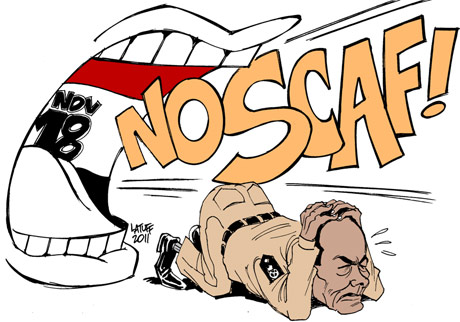
Cartoonist Carlos Latuff illustrates the protesters message to Tantawi following his speech last night.
Thousands of anti-government demonstrators have marched in the Yemeni capital Sana'a to express disgust at the immunity deal for president Ali Abdullah Saleh, Tom Finn reports from Sana'a.
A lot of people had expected a sense of relief from protesters that president is finally going to put pen to paper and transfer power to his deputy, but the mood is one of anger, he reports. "Hundreds of people have been killed and thousands wounded [so] the idea that Saleh and his sons can get off the hook is impossible for them [the protesters] to accept," Tom says.
Protesters also see the Gulf Co-operation Council deal as an inter-regime agreement, he reports.
One man said to me 'if you cut off the head of a plant, it doesn't take long for the plant to grow back,' suggesting there hasn't been the widespread changes that people have been calling for.
Although Saleh has backed out of previous deals, this time he really is expected to transfer power. "I would be very surprised if some sort of deal wasn't signed today," Tom says.
But there is still much uncertainty in Yemen, Tom adds, because two of Saleh's key rivals, the renegade general Ali Mohsen al-Ahmar, and the tribal leader Hamid al-Ahmar, have not agreed to the power transfer deal.
On why Saleh has finally agreed to sign the deal, an EU diplomat gave three possible explanations.
• The UN is involved and sanctions involving freezing Saleh's assets had been threatened.
• Saleh may still need medical treatment in Saudi Arabia as he is still recovering from the blast on his compound in the summer.
• Living standards have dropped so dramatically that the country is on the brink of civil war.
Welcome to Middle East Live on what looks set to be yet another momentous day. The main focus remains on the continuing protests in Eygpt but there are major developments across the region.
In Bahrain a crucial report is due on the crackdown against pro-democracy protests. Yemen's president Ali Abdullah Saleh appears poised to sign a deal to transfer power. And the international pressure against Syria's president Bashar al-Assad continues to mount. It is going to be difficult to keep track, but here's a summary of where things stand.
Egypt
• "We are not leaving, he leaves," the crowd chanted after Mohamed Hussein Tantawi, the head of the Supreme Council of the Armed Forces promised to accelerate the transfer of power to civilian rule. Hundreds of thousands of people in Tahrir Square rejected the offer, but the Muslim Brotherhood was more conciliatory as it is keen to press ahead with parliamentary elections.
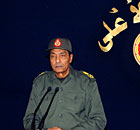
• In his TV announcement Tantawi made a series of moderate concessions including bringing forward presidential elections to before 30 June 2012, offering to handover power immediately if such a move was backed in a referendum, and apologising for the killings in the latest unrest. He also accepted the resignation of the cabinet and said the first round of parliamentary elections would take place next week.
Whether it's about police brutality, social change or politics, my feeling is that Egyptians want to feel like they've actually had a revolution. Whoever gives them that feeling might win the people in Tahrir over.
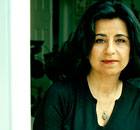
The reason the confrontations have blown up into all-out war so quickly is our now certain sense that Scaf – for all its protestations – doesn't intend to give up power ...
So the crucial thing now is to stand firm until Scaf hands over power. To whom? To a government of national rescue headed by any one or more of our potential presidential candidates – and this government would run the elections. That is what the revolution is back on the streets of Egypt for.
• The US has sharply stepped up criticism of Egypt's military rulers as Washington grapples once again with how to deal with an authoritarian ally in Cairo responsible for a bloody crackdown against people demanding democratic rights. Chris McGreal in Washington writes:
Washington's ambiguous approach echoes its indecision during the uprising that ousted Hosni Mubarak in February, and reflects an array of competing interests that have once again left the administration hesitant and grappling for direction in dealing with an authoritarian ally.
• US embassy officials are investigating the detention of three US students from the American University in Cairo who are accused of throwing petrol bombs at security forces in Tahrir Square. They were identified as Luke Gates, a 21-year-old exchange student from Bloomington, Indiana, who attends Indiana University, 19-year-old Gregory Porter, of Drexel University in Pennsylvania, and Derrik Sweeney, a Georgetown University student from Jefferson City, Missouri.
Yemen
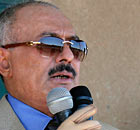
• President Ali Abdullah Saleh has flown to Saudi Arabia to finally sign a deal to transfer power in return for immunity from prosecution. Opposition politicians are expected to join him there later today. Saleh has backed down from signing the Gulf Co-operation Council initiative on three occasions.
Syria
• The United Nations human rights committee has added pressure on the Assad regime by condemning Syria's crackdown, as activist claimed 33 people were killed in the latest violence. The resolution, drafted by Britain, France and Germany, carries moral but not legal weight, the BBC points out.
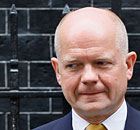
• Britain's foreign secretary William Hague has urged Syrian opposition figures to both overcome their differences and renounce violence. Speaking after a meeting with the Syrian National Council and other opposition figures, he said:
I've also emphasised the importance to them of achieving a united platform and a unified body among the opposition. At an extreme moment in their nation's history it is important for opposition groups to be able to put aside their own differences and come to a united view of the way forward. I've also emphasised to them the importance of non violent protest and the importance of retaining international support in this situation through non violent protest.
Bahrain
• Bahrain is braced for trouble as it awaits the publication of a crucial report on the Pearl roundabout uprising. Police fired teargas to disperse protesters at a funeral procession in Sitra, a Shia village that has become a regular focus of unrest. But political skirmishing has been under way for weeks, with the outcome of the investigation slammed as a "whitewash" by pro-democracy forces and hailed as a triumph of openness and accountability by the western-backed monarchy.
Libya
• Prime minister Abdulrahman El Keib has snubbed prominent Islamists by naming a cabinet of secularists. The biggest surprise on the list was Osama al-Juwali, chief of the Zintan military council, who was appointed defence minister at the expense of Islamist Hakim Bilhaj.
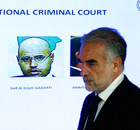
• The international criminal court's chief prosecutor, Luis Moreno Ocampo, confirmed the ICC had accepted Saif al-Islam will be tried in Libya. But the ICC will take part and "help" the authorities guarantee him a fair trial, Ocampo said.
Tunisia
• While much of the region remains in tumult, Tunisia took another big step from dictatorship to fully fledged democracy with the first first meeting of its newly elected constituent assembly. "There was an atmosphere of quiet pride in what has so far been a largely peaceful period of democratic transition," writes Eileen Byrne in Tunis.
"See, Egypt, that's how it's done," writes Michael Collins Dunn of the Middle East Institute.

